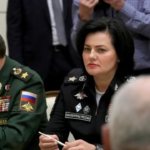NASA officials found it more difficult than they expected to surprise the astronauts of the Artemis II mission with the news that they were going to the moon.
Telling three NASA astronauts that they had been chosen to go to the moon was like trying to hold three surprise birthday parties — surprise parties where the recipients of the surprise inadvertently thwarted the plans of the organizers.
“It is a funny story,” said Victor Glover, the pilot of the moon mission, “because in one way or another, all of us were late or missed it in some fashion.”
On Monday, NASA announced the crew for its upcoming Artemis II mission that is to swing around the moon late next year. Of course, Joseph Acaba, the chief of the NASA astronaut office, had decided weeks before which three NASA astronauts he wanted to send on this trip: Mr. Glover, Christina Koch and Reid Wiseman.
(The fourth member of the crew is Jeremy Hansen of the Canadian Space Agency, and he was told separately.)
Mr. Acaba did not simply call or email them with the news.
This would be the first time in more than 50 years that humans would head toward the moon. “You wanted to find a way to get all those individuals in the same room without them knowing what it is — to make it special for them,” Mr. Acaba said.
He first checked when they would all be around that day at Johnson Space Center, the headquarters of NASA astronauts. Then, because the three might have become suspicious if they knew they were all being summoned to the same place at the same time, he concocted separate fake meetings for each of them.
Mr. Glover was coming back from a lunch meeting. “I was like, ‘Hey boss, I’m going to be a few minutes late,’” he said. “I sent him a text message.”
At the same time, Ms. Koch was at the Neutral Buoyancy Laboratory, the huge swimming pool facility where NASA astronauts simulate spacewalks underwater. It is several miles from the Johnson Space Center and she thought she could attend her meeting remotely.
“I opened up my computer to sign on to the virtual meeting and realized there was no link,” she said. “And so I texted our boss and said, ‘Hey, can we just meet virtually?’ And he said, ‘Nope.’”
She quickly drove back to Johnson. “I was late,” she said. “Very late.”
Mr. Wiseman was at the doctor’s office. “Like all good doctor’s appointments, this one was going way over,” he said.
He told Mr. Acaba he was going to miss the meeting, but Mr. Acaba said he should join via videoconference. When he did, Mr. Wiseman saw not only Mr. Acaba but also Mr. Glover, Ms. Koch and Norman Knight, NASA’s director of flight operations who is Mr. Acaba’s boss.
“I was like, Oh man, this is not the meeting I’m supposed to be missing,” Mr. Wiseman said.
“We feared that we didn’t show well at that moment,” Ms. Koch said.
And then they found out the news.
“After all the embarrassment,” Mr. Glover said, “they asked us how we felt about being the crew of Artemis II.”
Mr. Wiseman, who was selected as commander of the mission, said, “It wasn’t the greatest start.”
“They were a little bit late,” Mr. Acaba said. “And luckily, I didn’t want to change my mind.”
Mr. Hansen found out more simply, via a phone call from Lisa Campbell, the president of the Canadian Space Agency. “That was a pretty special phone call for me,” Mr. Hansen said. “And then I was permitted to share it with my wife and children as long as they were sworn to secrecy.”
Source: nytimes
















